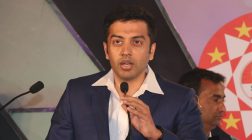FM may focus on fiscal discipline to boost FII morale: Poll
  |
Whether the government will reduce borrowing in the next fiscal year is too close to call, but economists polled by Reuters say its resolve to cut spending and giveaways in next week’s budget will reignite investor confidence.
Finance Minister P Chidambaram will deliver the annual budget on February 28, his last full budget before the country goes to the polls early next year.
Increased spending on social welfare and other benefits has been commonplace in Indian budgets for many years. But analysts say the tone of this budget will be different, steering clear of populist measures – even this close to an election.
“In view of this particular election, oddly enough, there may be political ground to be made on stressing that the government is keeping with its fiscal consolidation goal,” said Vishnu Varathan, economist at Mizuho Corporate Bank.
Indeed, officals involved in budget preparations told Reuters the finance ministry plans to slash the public spending target by up to 10 percent in the new fiscal year, which would make it the most austere budget in recent times.
Chidambaram has already slashed public expenditure in the current fiscal year to March by some nine percent from the original target.
In the Reuters poll, conducted between February14-21, 19 of 23 economists expected the budget to help bring in foreign investment.
Almost as many, 18, predicted the focus of Chidambaram’s budget speech will be on slashing subsidies and government handouts.
Eighteen said they expect spending cuts to mainly focus on fuel subsidies and defence. India’s fuel subsidy bill swelled by almost 73 percent in 2011-2012, compared to the previous year, while defence allocation rose 18 percent in the last budget.
The poll also predicted the finance ministry will axe spending on rural development and food subsidies.
“This will not be a common man’s budget simply because there is very little room for that,” said Jyotinder Kaur, economist at HDFC Bank.
India’s fiscal deficit target now stands at a revised 5.3 percent of GDP this fiscal year. Chidambaram has said he wants to get that down to 4.8 percent in 2013-14.
Economists in the poll were split on the chances of overall government borrowing in 2013-14 being reduced from Rs 570,000 crore in 2012-13.
BRINGING BACK FOREIGN INVESTMENT
Once considered a rising star in Asia, the Indian economy has lost its shine in recent years. Preliminary estimates released earlier this month showed growth dwindled to an annual five percent rate in the current fiscal year to March.
If confirmed, that would be the slowest growth rate that Asia’s third largest economy has clocked in a decade.
The poor performance is reflected in the rupee’s depreciation, as the current account deficit has widened due to weak exports and slack inflows of foreign direct investment.
The rupee has lost 18 percent against the dollar since the start of 2011, though the decline was limited to 3.5 percent in 2012. The rupee has gained 1.2 percent since the start of this year.
The currency’s weakness reflects India’s widening current account deficit due to weak exports and slack inflows of foreign direct investment.
A weak global economy, particularly among major trading partners like the euro zone, is partly to blame for India’s poor performance lately.
But the government’s hesitancy implementing reforms to attract foreign capital, and a ballooning current account deficit that has left India vulnerable to a potential downgrade in its sovereign debt to junk bond status.
To arrest the slide in investment, the government announced major reforms late last year that included, among others, permission for global retailers to set up shop in India and allowing foreign investment in aviation and broadcasting.
“By and large we expect investor confidence to grow rather than ebb given that…the Ministy of Finance has got its sights set on rather achievable goals and have put a lot of clarity on the direction they want policy to take,” added Mizuho Corporate Bank’s Varathan.
Why Chidambaram should play Angry Birds
I really have some major expectations from P. Chidambaram this budget. My expectations are accentuated given that his predecessor –Pranab Mukherjee did nothing during his term as Finance Minister. He did so little, that if Kumbhakarana (the demon who only slept) had to appoint a successor, then Pranab would make an ideal choice.
Now, back to Angry Birds and why Chidambaram should play this game asap (I mean immediately after reading this article).
1. Nani, Munna & Bahu can all play
The greatness about Angry Birds is that anyone and everyone can play it. My 85 year old Nani plays it and even enjoys it over ‘Noughts and Crosses’. Why so? Because Angry Birds is as simple as switching on the TV. Or to put it in the Indian context, it’s as simple as honking the car horn.
What Chidambaram will realise in the first 40 seconds of game play is the elegance of simplicity. And that is how his 2013 budget should be. Simple, elegant, easy to understand and comprehensible to all.
All the past budgets (his included), have sounded like monotonous mantras pundits recite during weddings and housewarmings. Everyone just wants the chanting to end so that they can run away (or attack the food).
Only someone of Chidambaram’s stature can make complexity simple, so that India and its citizens understand the gravity, heft and the importance of the most important document of the Government of India.
Only when people understand things can they appreciate them.
2. One rule for all players
In Angry Birds, you fling birds into pigs to destroy them. That’s it! I just described the core game mechanic of the world’s most popular game in a single sentence! Now, can Chidambaram take inspiration from the same and also make his budget single pointed and easy to ‘play along with’?
For instance, take two examples that Chidambaram could consider. As a mobile games entrepreneur funded by international venture capital, I struggle to make a dent in the global market. While I keep myself awake at night figuring out games, the last thing to contribute to my insomnia should be Indian tax and accounting rules.
But trust me, the rules, regulations, do’s and more importantly ‘don’t do’s’ are so frightening, that I have to keep working with my CFO and an army of consultants to keep out of harm’s way. Just to remit salary to my international employees requires me to sign at 17 places each month!
Also consider the long-drawn Vodafone tax case. Neither the government, nor the tax department nor Vodafone really seem to be clear about the rules and regulations that apply to this case. When I read “The government is open to a settlement”, I read between the lines like “We changed the rules and you got trapped, so let us help you out a bit.”
Chidambaram, please make the finance rules of our country so, so simple that Amitabh Bachchan can ask a few questions on them in the next round of KBC, with simple multiple answers. That should be your real test.
3. Killing many pigs with one bird
In Angry Birds, you can score the maximum points if you destroy all the enemy pigs with one bird! It’s funny how killing many birds with one stone has been turned around.
I think, what Chidambaram has to grapple with, is a triple challenge:
i) Making people pay taxes, not avoid them.
ii) Making people pay honest taxes.
iii) Making more people pay honest taxes.
I believe that if he thinks through this carefully, there is a ‘gamification’ (jargon that describes implementing game theory to any situation) that can be applied to budgets and to the collection of the tax codes.
For instance, why not have a ‘points’ system (like credit cards) for the tax we pay? The ‘points’ can then be used for special tax breaks or first-come-first-serve schemes? I am sure if Chidambaram convenes with the top 10 game-makers of the world, some great ideas will emerge!
4. The Devil is in the Level
Angry Bird’s genius is not in the graphics or the story of birds and pigs. It’s actually in the slow, almost invisible level design that makes the game as easy and as difficult to play as you like! Very quickly, everyone finds their own ‘comfort zone’ while playing Angry Birds and then progresses at their own pace.
What Chidambaram needs to do is create the same ‘comfort zone’ for the average Indian citizen and suck them gradually into the deeper tax game. To explain, I think that the real test of the first time tax payer is that she should be able to pay her taxes, herself, online or otherwise, just by spending a few minutes on a form. It should be nothing other than a few clicks and some “yeses” and “no’s”. Just like the immigration form we fill in when we land in India.
Once you get every citizen into the ‘tax graph’ (a pun on the word social graph that describes how people climb ranks on Facebook), then they can and will play deeper levels of the tax game and enrich the government. Once addicted, they will play and pay.
Chidambaram loves to quote the poet Thiruvalluvar in his speeches. Well, here is a quote for him to consider:










